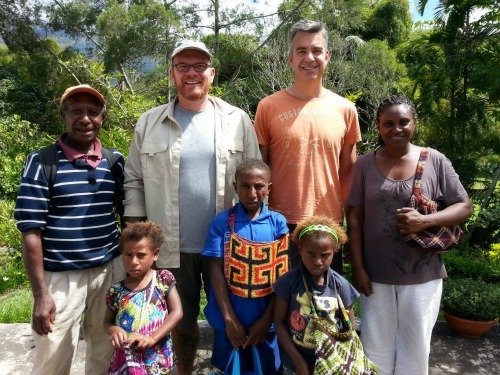PNG CONNECTION
While the majority of Living Koko’s cacao originates from Samoa, the company’s beginnings actually stem from Papua New Guinea (PNG). What started as a violent and traumatic trip to PNG grew into a mission to support and promote indigenous food sovereignty, ethical trade and sustainable farming businesses for Pacific Island communities.
In September 2013, Living Koko co-founder and co-owner Glen Reiss joined a number of friends on the adventure of a lifetime – a six-day trek through The Black Cat Track in north west Papua New Guinea (PNG). As a 20-year veteran of the Australian Defence Force, Glen has a natural interest in military history and snapped up the opportunity to join four of his friends along with three others in the trek, following six months of arduous training.
While the famed Kokoda Trail is well known in Australian history and military lore, the Black Cat Track is much less recognised, despite seeing some of the fiercest fighting between Australian and Japanese troops, and more loss of Australian lives in WWII. As such, the Black Cat Track is also less frequented by trekkers, and rated as a particularly difficult trek suitable only for experienced hikers. The 58km trail snakes past several villages, and through river torrents, dangerous ledges and steep inclines.
Glen’s trekking party (trekkers) first met as a group at Port Moresby airport, and spent time getting to know each other over beers before being transported to the start of the trek at Lae. The group was joined by several porters to assist the trekkers during the journey, all from local villages. Just an hour after arriving at their first camp at the end of the grueling first day of hiking, the group was brutally attacked by six armed men from local villages. The assailants violently attacked the entire group, targeting the group’s porters – killing two and maiming another four, with one of the injured later dying in hospital. The Australians were not spared, all assaulted and sustaining injuries, with Glen suffering head injuries. A number of the local porters had their Achilles tendons slashed in a deliberate move to limit their ability to continue to work as porters.
Following the nearly two-hour long ordeal, and stranded in the middle of rugged jungle, the surviving members of the group had to trek back in the dark to the nearest town for safety and medical attention, before being flown back to Australia in the following days.
Far from wanting to put the events of his trip and PNG out of his mind forever, on his way back to Australia two days after the attack, Glen felt this was only the start of his relationship with PNG. On return to Australia, the trekkers set up a trust. The trust raised money to help support the locals who had not only assisted and defended the Australian trekkers, but were left with no prospect of returning to work as porters, due to their injuries – and the families who had lost loved ones.
As part of this Trust, Glen and fellow trekker Steve Ward travelled back to PNG to visit the families and communities of the porters who were killed and injured to show active support and look into what support the Trust could provide.
“Myself and Steve went back the first time to show that we weren’t running away, and that we were a part of the story, we were with them. We wanted to meet the families and check up on the surviving guys to see how they were. There was no local support for them so we wanted to help.
“We distributed a little bit of cash and money by that stage, but we wanted to them to know that they knew it come from us and not from other people, and we wanted to meet the families of those that had been killed. We wanted to see the lay of the land to understand who the beneficiaries were, and above all to thank people that helped us.
“In Christmas 2013 we gifted pigs, rice and fish and all that sort of stuff to all the villages that were affected, because we just didn’t want to be seen as the victims, and none of us considered ourselves as victims. We were lucky, we got to get transported out, we got to get come home and we didn’t have to fight to be looked after or have quality medical treatment, it just sort of happened. So we wanted to make sure they knew we were supporting them and weren’t disappearing.
“We got to meet the extended families of people and sit down and talk to them and find out how they were going and most of them were embarrassed that we were attacked. They were obviously upset that people got killed, and that the surviving guys could no longer work as porters due to their injuries, but they didn’t hold us in any way responsible.”
The Trust was able to distribute a reasonable amount of funds to support people who suffered long term injuries and disabilities and to the families who suffered the loss of a loved one due to the attack.
Speaking to Andrew, one of the porters who suffered significant injuries and mobility impairments, Glen and Steve realised there may be an opportunity to help him and his village, and possibly the surrounding communities, by pursuing a cacao bean-to-table trade with Andrew’s village. They decided on investing their time and money to improve the village’s sustainable practices of cacao production and positively influence the community overall.
In the months that followed, he and fellow trekker Steve were inspired to consider how they may be able to help as individuals beyond the Trust’s reach [i]Glen and Steve began discussing ways to create sustainable support to those men who had assisted them.
“We brought Andrew back to Melbourne for surgery and recovery for three months, as the damage to his legs was so severe, and I got to know him quite well. He was telling me that he was concerned that he couldn’t walk anymore, he couldn’t hunt and he couldn’t forage.
“Because a lot of the farms in PNG are on the hillsides, he wouldn’t be able to stand and walk on the hillsides to farm and collect vegetables. But he was telling me they had cacao, but they were getting something like 50 cents per kilogram, which is very low. Steve had heard the same story so we both said to each other, “maybe we can do something.”
“We looked into it back in Australia and found a small cacao business that was selling up, and while we didn’t really know what we were doing, we just thought “we’ve got to do this,” and we formed Living Koko.”
While the cacao farming and export operations in PNG didn’t quite eventuate as Glen and Steve envisioned, fate soon intervened and truly brought Living Koko to life.
“We ran into some difficulties with getting export licences for Andrew, but he was eventually able to set up a fishing business with some of the money from the trust fund, and Steve parted with Living Koko soon after. But the entire experience was a wake-up call for me. Once we started with the idea of Living Koko I just thought “I’ve got to give something back somewhere.”
As destiny would have it, just months before the ill-fated trip to the Black Cat Track, Glen had met the perfect person to keep his vision of food sovereignty and ethical trade of cacao alive – his now wife, Phoebe Preuss. Phoebe’s grandfather was a revered pioneer of cacao farming in Samoa, one of the world’s top producing regions of premium grade cacao.
“Phoebe and I had met each other at around February/March of 2013, and at that stage I had no understanding or comprehension that she had a connection to cacao, let alone how central it was to her. But still, it wasn’t until around the time Steve and I talked about forming the company that Phoebe and I were really seeing each other and it was only then I got to understand how much cacao was part of her heritage and culture. So it was like, serendipity plus!
“Phoebe and I joined forces on a share of the company with me and the three of us got it started. Of course, now, it’s just the two of us, which I think was meant to be.”
Since then, the focus for Living Koko has been on cultivating and supporting small-plot farms in Samoa, due to Phoebe’s strong connections with the community and the high quality of cacao in the country, but the vision to return to PNG remains.
“There’s always been the intention to go back to PNG and work with farmers there, develop partnerships and to provide the same opportunity as in Samoa. Up until now it’s been about us finding our groove with Samoa.
“Ultimately, what this is all about is working with people for the right reasons, and with a meaning behind it. What I’ve learnt through my experiences in PNG and with working in Samoa with Phoebe is working in the islands is about people, trust and relationships.
“So many Westerners go across to Pacific Island communities and businesses and start talking business straight away, they don’t form a relationship first and establish that trust and their legitimacy. It doesn’t matter how much money you’ve got, people are quick to see through your intentions and if they don’t like it, they won’t want to work with you. I just believe in food sovereignty and building sustainable business around that, it can be done, to the benefit of everyone involved.
“I’ve worked in the corporate world, and I just got tired of the way people looked at things; I want to leave something positive when my working life and my life is finished. I just love sitting there working with Phoebe going ‘yep, doesn’t matter, we’ll do it this way.’ You’ve got complete freedom, don’t get me wrong, you’ve also got the risk, but at the end of the day when we look at all the things we’ve done, and all the people we’ve interacted with, it just fills your soul.
“We get to meet some amazing people with shared views and we get to learn from them, if your ears are open you continually learn, and that’s what I like about what we’re doing. Our business is bigger than just us, it’s about more than just making chocolate and selling koko, it’s about empowering people to create their own livelihoods, and creating connection and community. That’s what really matters.”

Living Koko acknowledges the Traditional Owners of the land on which we are based on, Narrm (Melbourne); the Wurundjeri and neighbouring Boonwurrung Peoples of the Kulin Nation, Australia. We pay our respects to their Elders, past, present and emerging. Sovereignty was never ceded.
This site is protected by SSL Security Certificate
Contact Us
Our Location
Unit 59, 56-68 Eucumbene Drive, Ravenhall. VIC. 3023, Australia - Wurundjeri Country
Living Koko - Samoa, Papauta, Apia, Samoa
Our Email
Our Phone
Don't Go Just Yet!
Copyright 2023 Living Koko | All Rights Reserved | web : footprintweb.com.au | MyDash | Sitemap



